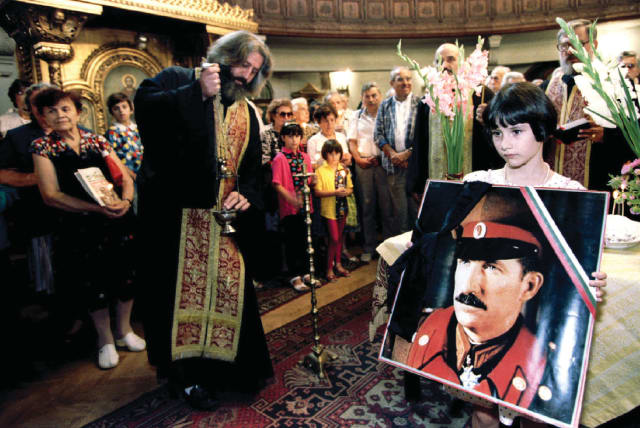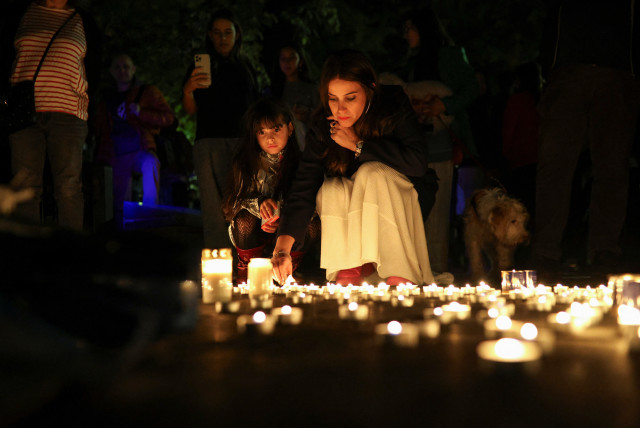A new dark comedy asks: Was Bulgaria’s King Boris III a friend or a foe of the Jews?

While Boris III is believed to have been horrified by the Nazis’ antisemitism, he was pressured into signing a law that sent Bulgarian Jews to concentration camps.
(New York Jewish Week) — King Boris III reigned over Bulgaria from his father’s abdication in 1918 — after Bulgaria’s defeat in World War I — until his mysterious death at 49 in 1943. A controversial leader who was nonetheless beloved by his people, the tsar is most remembered today for an action many historians don’t even credit him with: saving the lives of some 50,000 Bulgarian Jews during the Holocaust.
Despite this feat, the king’s relationship with the Jews under his rule was a complicated one. While Boris III is believed to have been horrified by the Nazis’ antisemitism, he was pressured into signing a law that sent Bulgarian Jews to concentration camps. However, public sentiment against this edict — it is widely believed that Bulgarians knew the fate for Jews sent to Germany and Poland was grim — convinced Boris III to reverse his decision.
And now, a new play explores the complicated history of this controversial leader. “The Brief Life & Mysterious Death of Boris III, King of Bulgaria,” whose North American premiere runs at 59E59 Theaters through June 2, doesn’t determine who deserves credit for saving Bulgaria’s Jews. Rather the play — which, despite its heavy subject manner, is an irreverent comedy — encourages audiences to draw their own conclusions.
Bulgarian-American actress Sasha Wilson, who co-wrote and acts in the play alongside her partner, Joseph Cullen, was inspired to create the piece when she and Cullen stumbled across a biography of Boris III, “‘Crown of Thorns” by Stephane Groueff, on her grandfather’s bookshelf in 2017. Wilson grew up in Boston and traveled to Bulgaria every summer, yet she had never heard the story of the tsar and how he thwarted the Nazi’s deportation of the country’s Jews.

“World War II is such a well-trodden period of history, and the UK and the US have very staunch ideas of their own involvement in it,” Wilson told the New York Jewish Week. “It just was so shocking that neither one of us had heard [about Boris III] and, especially me as a Bulgarian, that no one had mentioned it.”
“King Boris was genuinely loved by his people, as no other ruler had been in prewar Europe,” Groueff writes in his book’s intro. “But he was also accused of bringing Bulgaria into the German camp during World War II and criticized for exercising a ‘personal rule’ during the last eight years of his reign.”
Cullen and Wilson spent three years reading every book about the controversial Bulgarian monarch they could find. Ultimately, the play, a production of the Out of the Forest Theatre, which focuses on “misremembered or forgotten stories from history,” premiered at London’s VAULT Festival in March 2020 and later was staged at the Edinburgh Fringe Festival and the Arcola Theatre, where it was a smash success.
“Boris III” details the monarch’s life story, homing in on World War II as Hitler attempts to make Bulgaria an Axis ally and force the nation to give up its Jews. Boris, meanwhile, is caught between his sense of morality and the need to appease the Nazis and his pro-German war cabinet.
Everyday Bulgarian heroes
The play also spotlights the everyday Bulgarians who worked to save the country’s Jewish population. The play reaches its turning point as Boris secretly signs an edict to send 20,000 Jews to death camps, until righteous gentiles protest and hide Jews in their homes and shops.
In the play — as in real life — King Boris eventually reverses the edict as a result of public pressure. Instead, he forces all able-bodied Jewish men to build roads, saving them from deportation to Nazi concentration camps.
“The real heroes in this story are not the leaders like Winston Churchill, but the people on the ground who are really doing the work, and putting their lives on the line,” director and dramaturg Hannah Hauer-King, whose brother is Jonah Hauer-King, the Jewish star of “The Little Mermaid” and “The Tattooist of Auschwitz.”
King Boris III’s legacy remains up for debate among Bulgarian and Jewish historians. Some, like Groueff, believe he was a good man put in an extremely difficult position. And yet, despite the number of Jews saved in Bulgaria proper, the scale of death under his rule cannot be ignored: In exchange for regaining the territories of Thrace, Macedonia and Pirot from the Axis Powers, the 11,343 Jews living in the region were sent to Treblinka and Auschwitz. Only 12 survived.
Cullen, who stars as Boris, said that he makes sure not to play the tsar as a strong man but rather “a weak man who finds moments of strength.”
Throughout the play, as he grapples with his decision to strip Jews of their citizenship and passes laws to prevent Bulgaria from being “corrupted” by Jewish influence, he asks the audience: “What would you do?” Meanwhile, faced with pressure from his war cabinet, Boris III descends into a caricature of antisemitism on stage, trying to justify his behavior against the Jews while his actions simultaneously devour him.
“Bulgaria sits in a place where they are physically being torn from all sides and so you’ve got this central figure who has to make a series of really difficult decisions,” Cullen said. “He [Boris] obviously had fascistic tendencies, and yet, as a result of events that happened while he was the leader, nearly 50,000 lives were saved. Over 11,000 lives were also lost. And so our play asks, how could you possibly reduce this question down to ‘was somebody a good guy or a bad guy?’”
“I want audience members to reflect on the way that stories of history are told and feel struck by the complexity and how history doesn’t operate in black and white,” Hauer-King added.
Hauer-King, whose credits include feminist plays like “The Ministry of Lesbian Affairs” and “The Swell,” said she was drawn to the script because it highlighted everyday women’s efforts to save Bulgaria’s Jews.
“This is my first full-length play where my Jewishness is part of the experience and that has been really profound,” she said. “My relationship with my Judaism and my community is constantly changing, so I think being able to bring that into a rehearsal space has meant everything to me.”
The play features Slavic and Jewish music — including Bulgarian folk music, klezmer and cantorial tunes — performed by a live band on three-string instruments and a flute. “This is a Jewish and Bulgarian story, so we wanted to marry those different musical styles,” Wilson said. “The tonality of Bulgarian folk music is extremely similar to the Jewish melodies we were bringing into the room. I think that thematically speaks to the content of the work.”
Despite its implications of life and death, “Boris III” is a comedy, albeit a dark one. Slapstick and modern slang brings a lightness to the production. Cullen said humor can help make unsavory moments in history feel accessible.
“Certain stories are reserved for those in higher education and there’s not enough effort made to make sure that anybody could learn from a particular topic,” Cullen said. “We want everyone to leave and think, ‘This story’s for me.’”
“The Brief Life & Mysterious Death of Boris III, King of Bulgaria” will be performed at 59E59 Theater’s Theater A (59 East 59th St.) through June 2. For tickets and info, click here.
